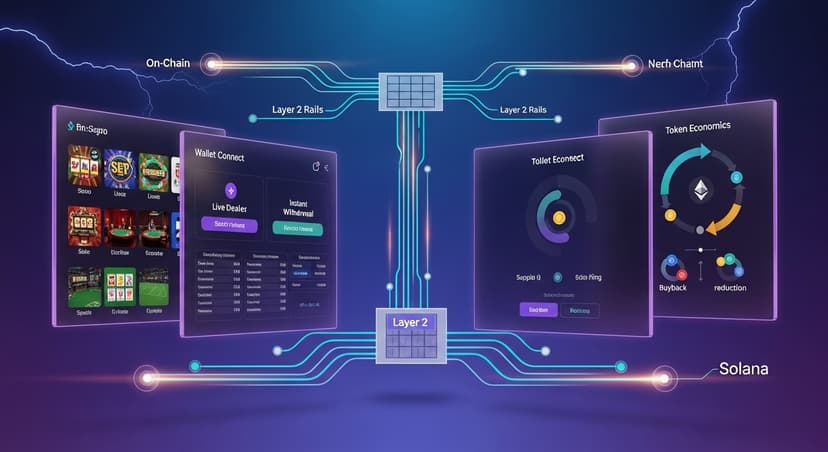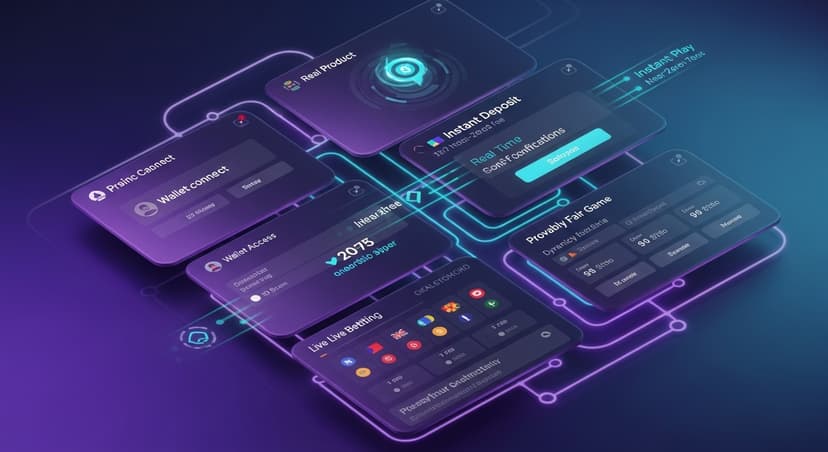Fast Crypto Bets: How We Slash Fees and Waiting Time
Why Speed Matters in Crypto Casinos
When we step into a crypto casino, we expect near-instant confirmations. Traditional on-chain transactions can take several minutes, leaving us staring at pending screens before placing our next bet. High fees compound the frustration, eating into our bankroll before the fun even begins. By focusing on faster transactions, we free ourselves to play without interruption. We can ride momentum in live-style games and move seamlessly between tables when we win or lose. Speed truly turns waiting into wagering.
Across many platforms, users report that a single unconfirmed transaction can cost up to five minutes of waiting time and five percent of their total stake in fees. This friction breaks immersion, reducing both enjoyment and profit. When we wager in seconds, we maintain engagement and make more informed choices about when and where to place our bets.
The Impact of Delays on Gameplay
Delayed confirmations break our concentration. In quick rounds of slots, every second counts. We lose valuable betting opportunities and feel disconnected from the outcome. Waiting also reduces transparency: it is harder to track pending bets and confirm payouts.
Technologies Enabling Lightning-Fast Bets
Crypto casinos rely on cutting-edge solutions to speed up wagers. Each method moves part of the process off the main chain, then settles later without compromising security.
| Solution | Confirmation Time | Typical Fee per Bet |
|---|---|---|
| Layer‑2 Rollups | 2–10 seconds | $0.01–$0.10 |
| State Channels | Instant | Negligible |
| Sidechains | 30 seconds–2 min | $0.05–$0.50 |
Layer‑2 Rollups
Layer‑2 rollups batch hundreds or thousands of off-chain transactions. A single cryptographic proof posts to the main chain, reducing gas fees by over 90 percent and cutting confirmation times to seconds. We place bets and see results almost instantly. Popular rollups include Arbitrum, Optimism, and zkSync, each offering a balance of speed and security.
State Channels
State channels open a direct, off-chain link between our wallet and the casino. Once established, bets and payouts occur within the channel instantly, without waiting for on-chain confirmation. Channel open and close transactions are the only on-chain events, keeping per-bet fees near zero. This approach works especially well for high-frequency betting sessions.
Sidechains
Sidechains operate as parallel networks secured by their own consensus mechanisms. We deposit funds onto a sidechain, place bets at speeds comparable to traditional app transactions, and then withdraw back to the main chain when our session ends. While sidechain security models vary, leading options like Polygon and BNB Smart Chain prioritize rapid block times and low fees.
Comparing Blockchain Latency
We often compare different blockchain layers and off-chain networks to gauge performance. Below is a quick snapshot of typical confirmation delays:
| Network Layer | Average Confirmation |
|---|---|
| Ethereum Main Chain | 2–4 minutes |
| Popular Layer‑2 Rollups | 5–10 seconds |
| Sidechains | 20–90 seconds |
| State Channels | Instant |
This table highlights why many casinos shift activity off the main chain. We win more bets when delays are measured in seconds instead of minutes.
Reducing Fees without Sacrificing Security
We keep costs low while maintaining trust through a mix of strategies.
Batch processing groups multiple bets into a single on-chain transaction, sharing fees among participants. Dynamic gas pricing adjusts fees in real time to match network congestion, avoiding expensive spikes. Native token incentives reward frequent play with additional rebates or fee discounts.
- Batch Processing: Shares transaction cost across dozens of wagers.
- Dynamic Gas Pricing: Responds to network load to keep fees minimal.
- Token Incentives: Rewards loyal players with discounts on future bets.
Each method works alongside audited smart contracts that reference on-chain proofs, ensuring funds cannot disappear and outcomes remain verifiable.
Security in Off-Chain Protocols
Moving activity off the main chain introduces new security considerations. We look for contracts that include:
- Escrow Mechanisms: Funds sit in a trustless smart contract until settlement.
- On-Chain Dispute Resolution: Channels offer on-chain exit options if disagreements occur.
- Proof-of-Execution: Rollup batches publish cryptographic proofs confirming transaction integrity.
By verifying these features in audit reports, we ensure that higher speeds do not compromise the fairness or confidentiality of our wagers.
How Fast Tech Shapes Our Betting Strategy
Faster transactions let us adapt quickly to game dynamics. We reinvest winnings without delay and adjust wager sizes on the fly. Quick payouts streamline bankroll management so we can seize hot streaks immediately. For example, in a rapid series of table rounds, we can double down within seconds of a win, maximizing our advantage. Low-latency environments also allow us to test new strategies more efficiently, since each trial completes in moments rather than minutes.
This agility enhances both profitability and enjoyment. When we are not waiting for confirmations, we stay focused on the game itself, making more deliberate choices and experiencing less downtime between rounds.
Choosing the Right Crypto Casino Platform
We look for specific features when selecting a fast-transaction casino:
- Supported Networks: Does it run on leading rollups, state-channel frameworks, and sidechains?
- Fee Transparency: Are gas costs and potential discounts clearly outlined?
- Wallet Compatibility: Do our preferred wallets integrate seamlessly?
- Security Audits: Are contracts and off-chain protocols audited by reputable firms?
- User Interface: Is the dashboard intuitive in displaying pending bets, channel status, and transaction history?
An ideal platform balances speed, cost, security, and usability. When all these elements align, our playing experience becomes seamless and worry-free.
Future Trends in Fast Crypto Betting
Innovation in scaling techniques continues at pace. We can expect:
- Cross-Chain Bridges: Place bets across multiple blockchains without manual token swaps.
- Layer-3 Protocols: Build on top of rollups for even greater throughput and lower fees.
- Decentralized Oracles: Supply real-time, tamper-resistant game data to ensure fairness.
- Privacy Rollups: Hide wager details and balances from public view without sacrificing verifiability.
As these trends mature, crypto casinos will keep pushing toward truly frictionless wagering. We look forward to a time when every bet clears instantly at tiny fractions of a cent, all secured by robust blockchain proofs.
FAQ
How do layer-2 rollups reduce confirmation delays?
They batch off-chain transactions into a single proof on the main chain, cutting confirmation times to a few seconds and distributing fees across many users.
Are state channels safe for frequent betting?
Yes. State channels lock funds in escrow contracts and only finalize balances on-chain when the channel closes or if disputes arise, ensuring both speed and security.
Which wallets best support fast-bet protocols?
Major wallets like MetaMask, Trust Wallet, Rainbow, and Coinbase Wallet integrate with popular rollups and sidechains. Always check a casino’s compatibility list.
Do faster transactions affect fairness?
No. Speed optimizations still rely on cryptographic proofs, on-chain randomness, and audited smart contracts to guarantee fair play.
What fees can we expect using these technologies?
Typical costs range from fractions of a cent up to ten cents per bet—far lower than the dollars-per-transaction fees on main-chain networks.












